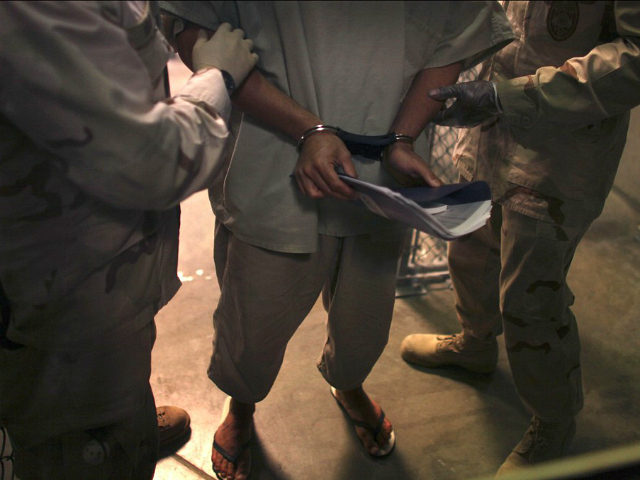President Barack Obama’s parole-style board has approved the repatriation of an al-Qaeda-linked Saudi bomb-maker — held at the U.S. military detention center in Guantánamo Bay, Cuba — who authorities believe may re-engage in terrorism against the United States.
The Gitmo detainee has been identified as Jabran Qahtani, 39.
In March 2002, he was detained in Pakistan where he received explosives training from al-Qaeda. By August of that year, he had been transferred to the Guantánamo facility, also known as Gitmo.
Qahtani had traveled to Pakistan from his home country to Afghanistan at the beginning of the war in October 2001 with the intention of fighting U.S.-led coalition troops.
In its final determination, Obama’s multi-agency Periodic Review Board (PRB) argues that “the risk the detainee presents can be adequately mitigated by transfer for prosecution and rehabilitation in Saudi Arabia.”
It adds:
The Board noted… the detainee’s expressed regret and commitment to not repeat his past mistakes, the detainee’s family commitment to support the detainee upon transfer, and the detainee’s recent positive change in behavior and mindset while detention.
The Board acknowledges the detainee’s past terrorist-activities and connections, specifically the detainee’s admission of support for the Taliban, association with two [al-Qaeda] leaders, and his training in building electronic boards.
Meanwhile, the PRB declared al-Qaeda-linked Yemeni Hani Saleh Rashid Abdullah, 47, a “forever prisoner” on November 21, the same day that it decided to approve Qahtani for release.
Abdullah, also known as Said Salih Said Nashir, traveled to Afghanistan in June 2001 where he trained with al-Qaeda. He was arrested in Pakistan in September 2002 and taken to Gitmo the following month.
Some detainees who had been previously designated too dangerous to release — “forever prisoners” — have been liberated by the Obama administration. The recent decisions come as outgoing President Obama has stepped up PRB reviews in his quest to keep his campaign promise of shutting down the Guantánamo prison.
Abdullah (Nashir) is expected to get another hearing on December 8.
A U.S. intelligence profile of Qahtani, dated March 4, notes that he received an electrical engineering degree from King Saud University in the Saudi capital of Riyadh.
It adds:
He received abbreviated weapons training at an [al-Qaeda] camp in Afghanistan and was selected by a senior [al-Qaeda] military commander to receive explosives detonator training in Faisalabad, Pakistan
…
His education and training also make [Qahtani] a skilled bomb maker, however, whose electronics expertise would be in high demand by terrorist organizations. Should [Qahtani] return to Saudi Arabia, we assess that he would seek out prior associates who could provide him a path to reengage in hostilities and extremism, if he chose to do so.
Nevertheless, he was approved for repatriation on November 21 by Obama’s board.
The PRB points out:
In making this determination, the Board considered the detainee’s credible desire to participate in the Saudi rehabilitation program and reintegrate into society, the detainee’s willingness to submit authority of the Saudi Government, the Board’s confidence in the efficacy of the Saudi rehabilitation program, and Saudi Arabia’s ability to implement security assurances after completion of the program.
Citing a January 2009 report from the U.S. military’s Joint Task Force-Guantanamo (JTF-GTMO), the U.S. intelligence profile reveals that the Saudi terrorist expressed his support for the Taliban, al-Qaeda’s ally, early in his detention at Gitmo.
He “repeatedly stated that he intended to rejoin the extremist fight against the US and its allies,” notes the profile.
The Obama administration disclosed the PRB’s dual decision regarding the release of Qahtani and indefinite detention of Abdullah on Tuesday.
Currently, 60 captives are being held at Gitmo.
Following the recent decision, the number of detainees approved for release by Obama’s board reached 21, and the number of “forever prisoners” increased to 29.
The remaining 10 Gitmo detainees “are in war crimes proceedings at military commissions, six of them death-penalty tribunals,” reports the Miami Herald.
U.S. Secretary of Defense Ash Carter has to approve security arrangements after providing 30 days notice to Congress for each prisoner that is to be released, which means some of them may not be liberated by President-elect Donald Trump’s Inauguration Day on January 20, 2017.
Nevertheless, the Miami Herald, citing an unnamed U.S. official with knowledge of the transfer process, reported last month that the Obama administration is currently not providing 30-day transfer notices to Congress as mandated by law.
Trump campaigned on a promise to keep Gitmo open and “load it up with some bad dudes.”

COMMENTS
Please let us know if you're having issues with commenting.